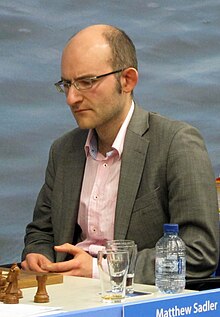Matthew Sadler
| Matthew Sadler | |
|---|---|
 Sadler at the 2012 Tata Steel Chess Tournament | |
| Full name | Matthew David Sadler |
| Country | England |
| Born | 15 May 1974 Chatham, England |
| Title | Grandmaster (1993) |
| FIDE rating | 2694 (April 2024) |
| Peak rating | 2694 (March 2020) |
| Peak ranking | No. 16 (July 1997) |
Matthew David Sadler (born 15 May 1974) is an English
Personal life
Sadler has a French mother, speaks French perfectly and is also qualified to play in closed French events. He was tipped to reach the heights scaled by other leading English players as Michael Adams and Nigel Short but made the decision to cease playing professionally in his mid 20s, opting for an IT career in the Netherlands.
Chess career
Sadler won the
For several years, he was the book reviewer for New in Chess magazine and also wrote books and articles for other chess magazines. In 2000, his book Queen's Gambit Declined (published by Everyman) was awarded the
Latterly a resident of
In a January 2012 interview, Sadler stated that chess was now primarily a "hobby" for him.[4] While relishing his return to tournament play, Sadler noted that he was now an amateur, and would not be coming back as a professional. He contrasts his present lighthearted attitude with his demeanor during his time as a professional, when he was "working ten hours a day and incredibly intensively".
Since 2019, Sadler has taken an interest in
Bibliography
- Sadler, Matthew (1997). The Slav. Everyman. ISBN 978-1901259001.
- Sadler, Matthew (1998). The Semi-Slav. Everyman. ISBN 978-1901259087.
- Sadler, Matthew (1999). Tips For Young Players. Everyman. ISBN 978-1857442311.
- Sadler, Matthew (2000). Queen's Gambit Declined. Everyman. ISBN 978-1857442564.
- Sadler, Matthew (2012). Study Chess With Matthew Sadler. Everyman. ISBN 978-1857449907.
- Sadler, Matthew; Regan, Natasha (2016). Chess For Life. Gambit. ISBN 978-1910093832.
- Sadler, Matthew; Regan, Natasha (2019). Game Changer. New In Chess. ISBN 978-9056918187.
- Sadler, Matthew (2021). The Silicon Road to Chess Improvement. New In Chess. ISBN 978-9056919832.
References
- ^ List of British chess champions Archived 2008-06-02 at the Wayback Machine
- ^ 11th European Chess Team Championship: Pula 1997, Individual statistics Olimpbase
- ^ BCF Book of the Year award-2000 British Chess Federation
- ^ Chessvibes Interview, "Matthew Sadler, Tata GM group C: "It's a hobby!" " Archived 30 March 2014 at the Wayback Machine (2012).
- ISBN 978-9056918187.
- ISBN 978-9056919832.
- ^ Sadler, Matthew (7 December 2021). "From Sadler's Engine Room: Not 100 draws, no double kills". New In chess Yearbook 141.
External links
- Official website
- Matthew D. Sadler rating card at FIDE
- Matthew D. Sadler chess games at 365Chess.com
- Matthew D. Sadler player profile at Chess.com
- Matthew Sadler FIDE rating history at OlimpBase.org
- Matthew Sadler player profile and games at Chessgames.com
- Matthew Sadler biography at Everyman Chess at the Wayback Machine (archived 2007-04-06)
